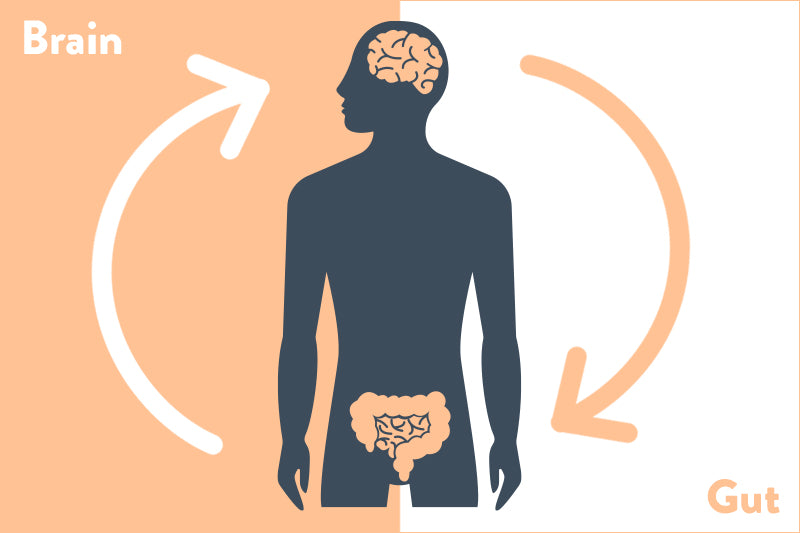Welcome to our blog, exploring the fascinating link between gut health and mental wellness. The gut-brain axis, a bidirectional communication system between the gut and the brain. It helps regulate digestion, emotions, mood, and mental health.
In this blog, we'll explore how diet and lifestyle choices can affect gut health and mental health. We'll also discuss the benefits of probiotics and prebiotics. Let's work together to improve our gut health and mental well-being so we can live happier, more balanced lives.
The Gut Microbiota: A Key Player in Mental Wellness
The bacteria in our gut are important for our overall health, including our mental health. An imbalance of gut bacteria can lead to conditions like anxiety, depression, and IBS. The gut microbiota influences mental well-being through its impact on neurotransmitter production, hormone regulation, and immune system modulation. The production of neurotransmitters, such as serotonin, has a direct influence on mood and cognitive function.
Additionally, the gut microbiota regulates inflammation, which can affect brain function and contribute to mental health disorders. Eating fiber and probiotics can help your gut bacteria, and can make you feel better mentally and physically. Recognizing the significance of gut microbiota highlights the importance of nurturing a balanced gut for optimal mental well-being.
GUT Health and Mood Disorders: The Connection Explored
Have you ever felt "butterflies" in your stomach when you're nervous? That's because the gut and the brain are intimately connected.
The enteric nervous system (ENS) also called as "second brain," consists of a vast network of nerve cells in the gut. It communicates with the central nervous system, which includes the brain. This interaction influences our emotions, mood, and mental health.
The Role of Gut Bacteria in Anxiety and Depression
Research shows that an imbalance of gut bacteria can lead to anxiety and depression. Gut bacteria help produce neurotransmitters and regulate inflammation, which is important for mental health.
Nurturing a healthy gut microbiota involves embracing a diverse, fiber-rich diet, fermented foods, managing stress, exercising regularly, and prioritizing sleep. These practices contribute to positive mental health outcomes and overall wellness. Understanding the connection between gut bacteria and mental wellness provides valuable insights for a holistic approach to overall well-being.
Gut Involves in Inflammation and Mental Health
Inflammation, the body's response to injury or infection, has a significant impact on mental health. The gut, a key player in regulating inflammation throughout the body, becomes crucial in understanding this connection. An imbalanced or damaged gut microbiome can cause chronic inflammation, potentially leading to conditions like depression and anxiety.
This inflammation can disrupt neurotransmitter production, increase gut permeability, and affect brain function. Nurturing a healthy gut through a balanced diet, exercise, stress management, and sufficient sleep helps reduce inflammation. This promotes a healthier gut-brain axis and contributes to improved mental well-being.
Gut-Brain Communication: Neurotransmitters and Beyond
The gut and the brain communicate through various channels, including neurotransmitters. These chemical messengers play a vital role in transmitting signals between nerve cells. Serotonin, for example, a neurotransmitter often associated with happiness, is primarily produced in the gut. This highlights the significance of a healthy gut in maintaining a balanced mood.
Gut Health Strategies for Enhancing Mental Wellbeing
Improving your gut health is a key strategy for enhancing your mental well-being. Adding unprocessed foods like fruits, vegetables, and whole grains into your diet provides essential nutrients that help beneficial gut bacteria thrive. Additionally, increasing your intake of prebiotic foods like bananas, garlic, and onions nourishes these bacteria.
Focusing on gut health strategies and reducing processed food intake creates a supportive environment for your gut microbiome. This can have a positive impact on your mental well-being, including mood and symptoms of anxiety and depression. Prioritizing your gut health is a powerful step toward nurturing your overall well-being.
The Impact of Diet on Gut Health and Mental Wellness
The impact of diet on gut health and mental wellness is significant. Foods that have lots of sugar, and unhealthy fats can mess up the good bacteria in your gut. This can make your body inflamed and cause problems with your feelings and thoughts.
Choosing a balanced diet with lots of fiber, lean proteins, and healthy fats helps keep our gut healthy. It helps good bacteria grow and lowers inflammation. So it's best to pick whole, unprocessed foods for a healthy body and mind.
Probiotics and Prebiotics: Promoting a Healthy Gut-Brain Axis
Prebiotics, serve as food for these beneficial gut bacteria. Probiotics are live bacteria that can be beneficial for your gut health. Adding probiotic-rich foods like yogurt, sauerkraut, and kimchi into your diet can introduce healthy bacteria to your gut. Additionally, consider probiotic supplementation to further support the gut microbiome.
Also, considering wholesome gut health supplement-containing prebiotic fiber, probiotic, and postbiotic support the healthy GUT-Brain axis.
Lifestyle Factors for a Healthy Gut and Balanced Mind
In addition to diet, several lifestyle factors can contribute to a healthy gut-brain axis. Prioritize stress management techniques like meditation, exercise regularly, and get enough sleep. Chronic stress can disrupt the balance of bacteria in your gut and impact your mental well-being. By addressing these lifestyle factors, you can nurture a healthy gut and promote a balanced mind.






